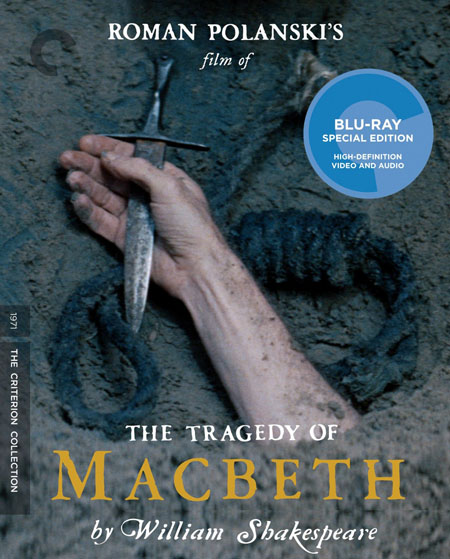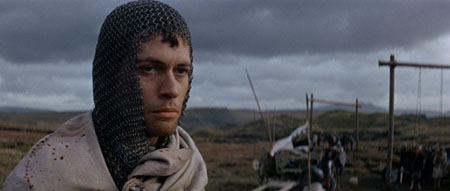
RETRO-ACTIVE: THE BEST FROM THE CINEMA RETRO ARCHIVES
“BLOOD AND PRESTIGEâ€
By Raymond Benson
(Portions
of this review are reprinted from the article “Playboy Goes to Hollywood,†by
the same author, which appeared in Cinema
Retro, Volume 2, Issue #5, 2006.)
The
Criterion Collection has seen fit to release on Blu-ray and DVD (separate
packaging) Roman Polanski’s striking film adaptation of William Shakespeare’s Macbeth, originally released in 1971.
Not very well received at first, the picture’s reputation has grown over the
years such that it is now arguably considered the definitive version of the “Scottish
play†on celluloid (although Akira Kurosawa’s 1957 Throne of Blood is certainly a contender). Gritty, realistic, and
violent, Polanski’s vision is dark and troubling—as the story is meant to be.
It’s possible that some of the negative
press it received in 1971 was due to the fact that it was the first major
motion picture produced by Playboy Productions, with Hugh M. Hefner serving as
executive producer, while Playboy executive Victor Lownes II served as assistant
executive producer (Andrew Braunsberg, a close friend of Polanski’s, was credited
as producer). The film came about as a result of the friendship between
Polanski and Lownes. The director had
been recovering from the tremendous amount of grief he had suffered after the
murder of his wife Sharon Tate at the hands of the Manson family in 1969—he
needed something that would help purge himself of the ugly and violent images
in his head and heart. Shakespeare’s controversial and bloody play seemed to be
the right vehicle. (Some say the play is unlucky—there are still theatre people
who refuse to refer to it by name.)
Indeed, making the film was something
of a catharsis for Polanski—there were a few occasions in which he unwittingly
referred to the lead actress as “Sharon.†Adapted by renowned playwright and
critic Kenneth Tynan, Polanski’s Macbeth
became a poster child for the handful of ultra-violent pictures to be released
in 1971—the same year as A Clockwork
Orange, Dirty Harry, and Straw Dogs. The blood flows freely in Macbeth—a decapitation is even presented
most realistically—but to focus solely on the film’s violence does not do it
justice. The film is a remarkably faithful adaptation of the play.

“Corporate was initially against the
idea,†Hugh Hefner said in a 2006 interview for Cinema Retro. “It was not a very commercial undertaking, and I knew
it wouldn’t make any money. Victor made a strong case to do it and I agreed
with him. It was more of a prestige thing for Playboy. Playboy and Shakespeare?
Who would have thought?â€
The film was made in Scotland, of
course, and featured mostly unknown but highly talented stage actors—Jon Finch
as Macbeth, Francesca Annis as Lady Macbeth, Nicholas Selby as Duncan, Stephen
Chase as Malcolm, Martin Shaw as Banquo, and Terence Bayler as Macduff. At one
point during production, Polanski ran over schedule and over budget, causing
the insurance backers to drop the guarantee. Hefner had to fly to London, take
stock of the situation, and personally guarantee the completion of the film
with Playboy Productions’ money.
Back home in the States, Hefner viewed
the dailies at the Playboy Mansion. Hefner remembered, “For my birthday that
year, the cast—on film—suddenly stopped the action of a scene and began singing
‘Happy Birthday’ to me.â€
The film did receive a number of very positive reviews and a few awards,
too—it won Best Picture from the National Board of Review and won a BAFTA for
Costume Design. “Of course, as I predicted, it didn’t make any money,†Hefner
said. “In fact, it lost money. But we
didn’t really care. It was a good picture and I’m proud of it. I believe since
its release the film has gone into the black.â€
Criterion’s new 4K digital restoration,
approved by Polanski, with 3.0 surround DTS-HD Master Audio soundtrack is
assuredly the best possible presentation of this remarkable film. The dreary
Scottish landscapes are gorgeous in their own way, and you can feel the mud and
slop in every scene. Extras include a new documentary featuring interviews with
Polanski, Braunsberg, Lownes, and actors Annis and Shaw; a 1971 documentary
featuring rare footage of the cast and crew at work; an interview with Kenneth
Tynan from a 1971 episode of The Dick
Cavett Show; and a segment from the 1972 British TV series Aquarius featuring Polanski and theatre
director Peter Coe. Critic Terrence Rafferty’s essay in the booklet rounds out
this exceptional package from The Criterion Collection.
Grab it! Just don’t ever pronounce the
name of the play aloud!
CLICK HERE TO ORDER FROM AMAZON